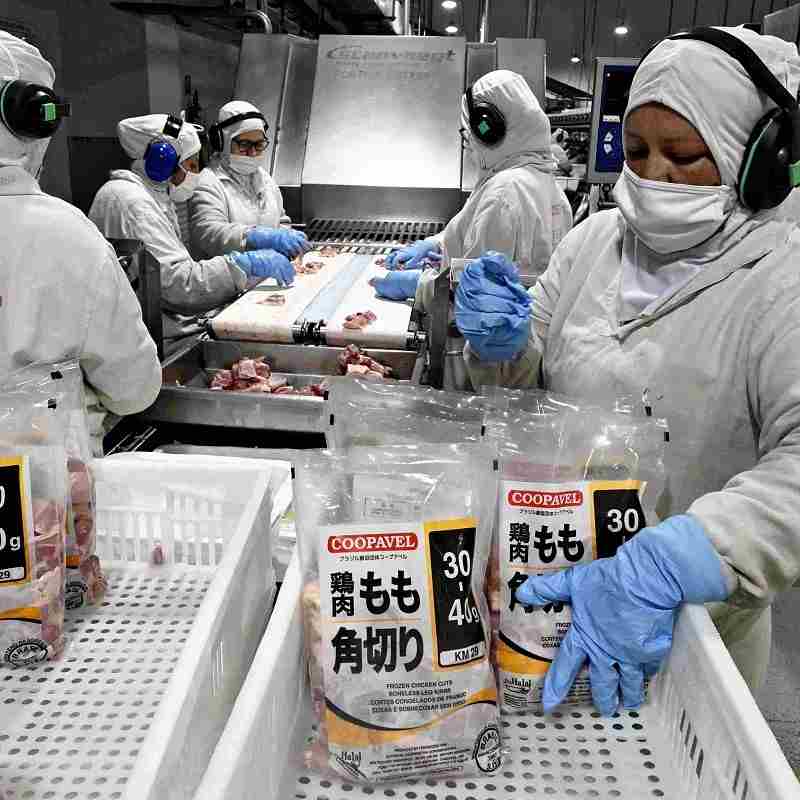Future world order: Economic tug-of-war / Japan losing ground in competition to buy chicken

Chicken is processed for export to Japan on Dec. 3, 2022, in Cascavel, Parana State, Brazil.
11:36 JST, January 11, 2023
The post-Cold War global structure has collapsed amid the confrontation between the United States and China, and Russia’s invasion of Ukraine. What will become of the world order long led by the United States? What strategies should Japan take in response? The following is the fourth installment in a series of articles examining the struggle for dominance among global powers in the economic arena.
***
In the city of Cascavel, Parana State, in southern Brazil, more than 26,000 chickens were crowded together in a dark barn, waiting to be shipped.
Brazil, the world’s largest chicken exporter, supplies roughly 30% of the global market. However, poultry farmers in the country are currently struggling with a surge in feed prices. “I’ve never experienced a critical situation like this,” poultry farmer Biramir Tussi, 64, said with a glum look.
Feed accounts for more than 70% of total costs. According to a cooperative association to which poultry farmers including Tussi belong, the average purchase price of corn for feed in 2022 was 2.7 times higher than in 2019 and that of soybeans was 2.4 times higher.
Because China has increased its imports of these commodities, their international prices have been on an uptrend. In addition, Russia’s invasion of Ukraine has fueled concern over a global grain shortage, which also accelerated the price spike. Tussi, who ships 4 million chickens a year, was forced to lay off eight employees to cut labor costs.
Japan depends on imports for many foods. Most imported chicken comes from Brazil, and Brazilian chicken meat is widely used by low-cost restaurant chains. After the cooperative association to which Tussi belongs began exporting chicken to Japan in 1997, Japan remained its largest export destination until 2020, when China surpassed Japan as the largest importer of the association’s chicken.
An official at a Sao Paulo-based Japanese trading company that is trying to secure supplies of chicken said: “In the past, no country bought chicken for a higher price than Japan. But since around 2019, we have been asked by suppliers to increase the purchase price because China would buy chicken for a higher price. Actually, some suppliers changed their business partners, saying, ‘We have decided to sell chicken to China.’”
Japan has suffered from deflation for many years and the purchasing power of people in Japan has declined relative to people based in other countries. Businesses are hesitant to pass on increased costs via retail prices, which makes it difficult to offer higher purchase prices to suppliers.
European and Middle East countries that have imported chicken mainly from Ukraine are now also focusing on Brazil. “We Japanese might be about to enter a time when we completely lose the purchasing competition,” the trading company official said, expressing a strong sense of urgency.
Over the past 25 years, Japan has benefited from the free trade system under the World Trade Organization, which was officially established in January 1995, and has stably imported food. With China having joined the WTO in 2001 and Russia in 2012, the Agreement on Agriculture now applies to 164 WTO member states and regions. Chapter 12 of the agreement provides that “the Member instituting the export prohibition or restriction shall give due consideration to the effects of such prohibition or restriction on importing Members’ food security.”
However, this WTO rule has been undermined. According to data released by the International Food Policy Research Institute based in Washington D.C. and other documents, 29 countries including India, Indonesia and Kazakhstan are confirmed to have implemented food export restrictions since Russia invaded Ukraine and 19 countries still had such restrictions as of the end of November.
“Article 12 was a provision added at the proposal of Japan, an importing country, from the perspective of food security,” said Kazuhito Yamashita, research director at the Canon Institute for Global Studies and former Agriculture, Forestry and Fisheries Ministry official who had participated in final negotiations to formulate the agreement in 1993 as a member of the Japanese negotiating team. “Countries that export grain in peacetime [prioritize] supplying grain to their own citizens in emergencies, which is actually the global trend of food security. ”
Top Articles in Politics
-

Japan PM Takaichi’s Cabinet Resigns en Masse
-

Sanae Takaichi Elected Prime Minister of Japan; Keeps All Cabinet Appointees from Previous Term
-

Japan’s Govt to Submit Road Map for Growth Strategy in March, PM Takaichi to Announce in Upcoming Policy Speech
-

LDP Wins Historic Landslide Victory
-

LDP Wins Landslide Victory, Secures Single-party Majority; Ruling Coalition with JIP Poised to Secure Over 300 seats (UPDATE 1)
JN ACCESS RANKING
-

Producer Behind Pop Group XG Arrested for Cocaine Possession
-

Japan PM Takaichi’s Cabinet Resigns en Masse
-

Man Infected with Measles Reportedly Dined at Restaurant in Tokyo Station
-

Israeli Ambassador to Japan Speaks about Japan’s Role in the Reconstruction of Gaza
-

Videos Plagiarized, Reposted with False Subtitles Claiming ‘Ryukyu Belongs to China’; Anti-China False Information Also Posted in Japan
























